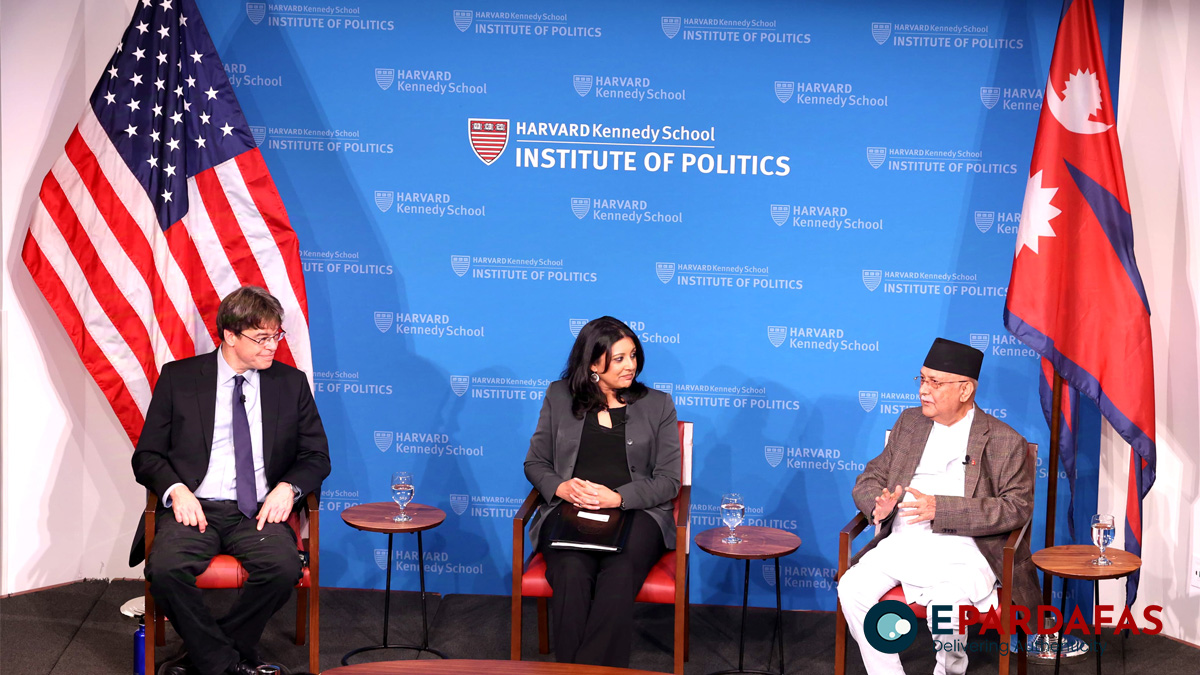
PM Oli: Nepal Committed to Concluding Transitional Justice and Addressing Climate Change
Prime Minister KP Sharma Oli expressed Nepal’s commitment to concluding its long-overdue Transitional Justice (TJ) process and addressing the global climate crisis in a speech at the John F. Kennedy Jr. Forum at Harvard University. His remarks covered Nepal’s efforts to heal the scars of its conflict period and the nation’s role in the global fight against climate change.
Transitional Justice: A Commitment to Victims and Society
Addressing the TJ process, Prime Minister Oli assured the audience that Nepal is determined to conclude this chapter in its history, providing victims of the decade-long civil conflict with legal remedies, reparations, and justice. “I want to assure you that the process of transitional justice will protect victims’ rights and interests, including legal remedies. It will involve seeking truth, providing reparation, and bringing perpetrators of serious crimes to justice,” he said, emphasizing that there will be no blanket amnesty for those involved in serious crimes.
Oli acknowledged that frequent changes in government had delayed the implementation of the TJ process for over 18 years following the signing of the Comprehensive Peace Accord. However, he highlighted recent progress: “Immediately after the formation of my government, the Transitional Justice bill was passed by the parliament with near consensus.”
He also welcomed international support, particularly from Nepal’s partners, to ensure the effective implementation of the Transitional Justice Act, as the country approaches the final stages of its peace process. Oli underscored that Nepal’s peace-oriented ethos, as the birthplace of Gautam Buddha, fuels its commitment to reconciliation and societal healing.
Climate Justice: Calling for Global Responsibility
Shifting focus to climate justice, Prime Minister Oli made a passionate plea for developed nations to take proportionate responsibility in combating climate change. He stressed that least developed countries (LDCs) like Nepal are bearing the brunt of a crisis they did little to create. “This is a gross injustice meted out by the advanced industrialized economies with their centuries of exploitation of nature and emissions of greenhouse gases that are largely responsible for global ecological harm,” Oli stated.
He called for the full implementation of the “Loss and Damage” fund, established at a recent UN Climate Change conference, which aims to compensate vulnerable nations for climate-related damages. “For us, climate justice is plain and simple: those who pollute the environment have to pay proportionately,” Oli remarked.
Although Nepal is one of the lowest emitters of greenhouse gases, it remains one of the most climate-vulnerable countries. Oli highlighted the importance of Nepal’s Himalayan ecosystem, which helps regulate the global climate and feeds vital rivers that support billions of people. However, the melting of Himalayan glaciers poses severe risks to both Nepal and its neighboring countries.
“Our mountains play a crucial role in regulating the climate and ecosystem of oceans and mountains, with their snow-fed rivers flowing down to the oceans,” he said. Despite Nepal’s contributions through its forests and rivers, it continues to suffer from climate change impacts caused primarily by industrialized nations.
A Vision for the Future: Net Zero by 2045
Prime Minister Oli reaffirmed Nepal’s commitment to sustainability, stating that the country has set an ambitious target to reach net-zero carbon emissions by 2045, five years ahead of the global target. He urged for global cooperation to combat the climate crisis, calling for “commitments, solidarity, and collective action on an unprecedented scale.”
Oli also emphasized that Nepal’s Constitution guarantees civil liberties, human rights, and a multiparty democratic system, aimed at building an inclusive and prosperous nation. He described the Constitution as a key instrument in addressing the root causes of conflict through social, political, and economic reforms.
In conclusion, Prime Minister Oli’s speech underscored Nepal’s dual focus on concluding its transitional justice process and advocating for global climate justice, with the aim of creating a peaceful, prosperous, and environmentally sustainable future for all.














Comments